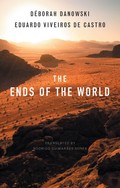The Ends of the World

1. Auflage November 2016
180 Seiten, Hardcover
Wiley & Sons Ltd
Kurzbeschreibung
The end of the world is a seemingly interminable topic ? at least, of course, until it happens. Environmental catastrophe and planetary apocalypse are subjects of enduring fascination and, as ethnographic studies show, human cultures have approached them in very different ways. Indeed, in the face of the growing perception of the dire effects of global warming, some of these visions have been given a new lease on life. Information and analyses concerning the human causes and the catastrophic consequences of the planetary 'crisis' have been accumulating at an ever-increasing rate, mobilising popular opinion as well as academic reflection.
In this book, philosopher Déborah Danowski and anthropologist Eduardo Viveiros de Castro offer a bold overview and interpretation of these current discourses on 'the end of the world', reading them as thought experiments on the decline of the West's anthropological adventure ? that is, as attempts, though not necessarily intentional ones, at inventing a mythology that is adequate to the present. This work has important implications for the future development of ecological practices and it will appeal to a broad audience interested in contemporary anthropology, philosophy, and environmentalism.
The end of the world is a seemingly interminable topic ? at least, of course, until it happens. Environmental catastrophe and planetary apocalypse are subjects of enduring fascination and, as ethnographic studies show, human cultures have approached them in very different ways. Indeed, in the face of the growing perception of the dire effects of global warming, some of these visions have been given a new lease on life. Information and analyses concerning the human causes and the catastrophic consequences of the planetary 'crisis' have been accumulating at an ever-increasing rate, mobilising popular opinion as well as academic reflection.
In this book, philosopher Déborah Danowski and anthropologist Eduardo Viveiros de Castro offer a bold overview and interpretation of these current discourses on 'the end of the world', reading them as thought experiments on the decline of the West's anthropological adventure ? that is, as attempts, though not necessarily intentional ones, at inventing a mythology that is adequate to the present. This work has important implications for the future development of ecological practices and it will appeal to a broad audience interested in contemporary anthropology, philosophy, and environmentalism.
Acknowledgments
Prefatory Note
Chapter 1 What rough beastÉ
Chapter 2 ÉIts hour come round at lastÉ
Chapter 3 É Slouches towards Bethlehem to be born?
Chapter 4 The outside without thought, or the death of the Other
Chapter 5 Alone at last
Chapter 6 A world of people
Chapter 7 Humans and Terrans in the Gaia War
Conclusion: World on the brink
Notes
Bibliography
Dipesh Chakrabarty, The University of Chicago
"This is a passionate, profoundly intelligent book. The ends of time are not the Anthropocene; that is a boundary, not a destiny. What comes next cannot be allowed to be the barbarism of the techno moderns. In this book, recomposition tracks along the Möbius strip of still imaginable, still liveable thought, mythology, and world-making practices indigenous to terrans. Actual indigenous peoples, who have refused to end in end time after end time, can perhaps teach the 'needed subsistence of the future."
Donna Haraway, University of California
Eduardo Viveiros de Castro is Professor of Anthropology at the National Museum of the Federal University of Rio de Janeiro.


